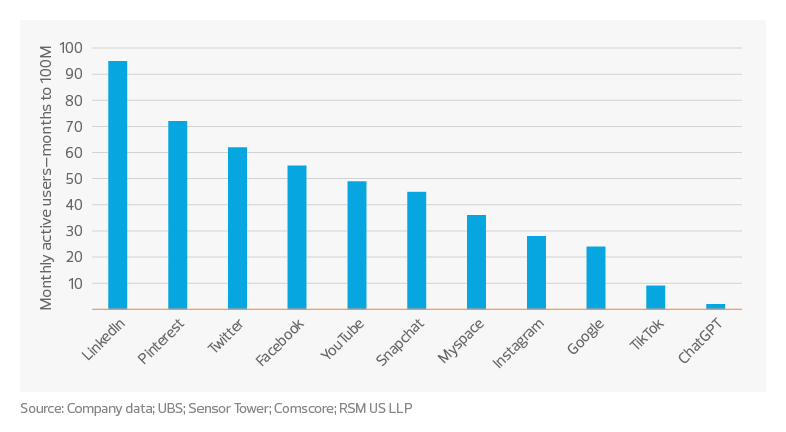AI programs have the potential to revolutionize processes at media and entertainment companies.
Key takeaways
Companies already use AI in many processes, such as script development and content customization.
As AI becomes more accessible, middle market companies can capitalize on its extensive benefits.
The contributions of mid-20th-century mathematician and code breaker Alan Turing to artificial intelligence remain an inspiration today. Turing’s 1950 research paper produced at the University of Manchester, "Computing Machinery and Intelligence," set a standard for AI development. The Turing test, commonly known as “the imitation game,” is widely considered a benchmark for measuring the success of artificial intelligence. The test—which evaluates the ability of a computer to participate in written dialogue with a human—determines whether machines can demonstrate intelligence on par with human response.
In an incredible milestone, Google’s chatbot system achieved the formerly unthinkable, passing the Turing test in June 2022. Since then, another generative AI system—ChatGPT—has also succeeded at displaying human levels of insight. These feats mark a major leap forward for AI technology and have ushered in endless opportunities to explore what machines can do for a variety of industries.
Though still far from perfect, generative AI technologies have the potential to revolutionize many industries, including media and entertainment. Already this industry has quickly adopted these technologies, deploying them in creative processes ranging from generating first drafts of TV scripts to helping customize digital content for individual users.
ChatGPT’s quick user adoption

While these technologies offer the advantages of increased efficiency and reduced costs, they compel middle market businesses to adapt and invest to remain competitive. Companies must be aware of the potential impact of AI on their business, strive to understand its implications, and seek out ways to leverage it for their own benefit.
Generative AI is a powerful form of artificial intelligence that has the potential to revolutionize content creation. In its truest form, it differs from other forms of AI because it generates new content instead of analyzing and categorizing existing material. With its capabilities, the technology empowers creators to produce highly personalized content that can effectively engage a target audience. The impact of generative AI on content creation is profound, unlocking new possibilities for streamlining workflows, reducing costs and enhancing the overall quality of output.
For middle market media and entertainment companies, the use of generative AI for content creation presents both significant opportunities and serious threats. On one hand, if adopted intentionally and leveraged intelligently, it has the power to elevate a middle market company's ability to compete on a much larger stage. On the other hand, if the vision is unclear to the workforce, the adoption strategy is not well-prepared or executed, or if the emerging technology is ignored completely, it has the potential to pose an existential threat. Investors are increasingly recognizing the opportunities presented by generative AI, leading to a surge in investment. In just the first 70 days of 2023, global investment by private equity and venture capital in generative AI reached $2.38 billion and is on pace to exceed 2022’s total investment of $5.3 billion. Of those invested companies, 16 reached unicorn status, although some had exceeded the $1 billion valuation prior to their most recent financing.
Investment in generative artificial intelligence–globally

Generative AI is rapidly transforming the media and entertainment industries, offering new tools for creators to craft storylines, build characters and develop experiences. It is helping to streamline the creative development process by generating highly realistic digital imagery and rapidly developing ideas for stories and screenplays. Furthermore, AI-powered tools can analyze massive amounts of data to provide insights into audience preferences, enabling creators to develop content that resonates with their target audiences. As generative AI evolves, it is expected to play an increasingly significant role in the creation of media and entertainment experiences in film and TV, as well as in publishing.
TAX TREND: Software development
Media and entertainment companies that spend significant sums on research or software development likely are affected by the unfavorable change in the required tax treatment of R&D expenses. Businesses might minimize this burden by analyzing their costs to ensure proper treatment and carve out those that may not require capitalization under the new law. Once they identify and quantify their R&D costs, they may find they are eligible for an R&D tax credit or other incentives.
Film and TV
With the development of tools like Dramatron, by Alphabet’s DeepMind, writers can generate first drafts of storylines and scripts with the assistance of generative AI, speeding the content creation process and increasing output. Although the use of AI in content creation is still a relatively new concept, its applications are already seen in the TV industry; for instance, the 24th season of the animated series South Park used AI technology for production.
The use of generative AI in post-production is also becoming popular due to the technology’s ability to improve efficiency and cut editing costs. Hollywood director Scott Mann is a co-founder of Flawless, a company using generative AI to make hyper-realistic changes to filmed content by dubbing different languages seamlessly. The technology adjusts an actor's mouth movements to match the language overlay, resulting in a more natural and realistic dubbed version. Another technology, Metaphysic, utilizes generative AI to make actors appear younger, an effect seen in the upcoming Tom Hanks film Here, according to Fast Company.
Publishing
BuzzFeed is one company using generative AI to attract and retain users by creating more personalized content. The digital media company recently announced plans to collaborate with Open AI, the developer of ChatGPT, to further personalize BuzzFeed’s successful online quizzes, which received over 1 billion views in 2022. According to Bloomberg News, BuzzFeed’s CEO recently shared with employees that content creation using AI will be an integral part of the company’s core business in 2023. The plan to leverage AI for content creation is expected to reduce production time and cost.
As AI technologies become increasingly accessible, middle market companies can join larger corporations in capitalizing on the benefits. With capabilities such as machine learning, digital imagery and natural language processing at their fingertips, middle market enterprises can drive growth while improving efficiency and reducing costs.
Implementing a new comprehensive AI strategy involves defining business objectives, identifying use cases and deploying the technology. Even though this process may be time-consuming and costly, these challenges are often offset by several positive outcomes, including:
- Improved efficiency: Automation of aspects of content creation, such as screenplays, video game city generation, quizzes, etc.
- Cost savings: Reduction in labor costs
- Competitive advantage: The ability to produce more personalized content than competitors
- Improved content: Higher-quality output to attract and retain customers
TAX TREND: Sell-side diligence
The new required tax treatment of R&D expenses is also affecting M&A by worsening the tax posture of targets. Transaction planning that includes R&D cost analyses may enable deals to proceed by reducing the cash tax rate. However, the utilization of favorable tax attributes, such as net operating losses, may be limited by a change in ownership, which must be taken into account.


